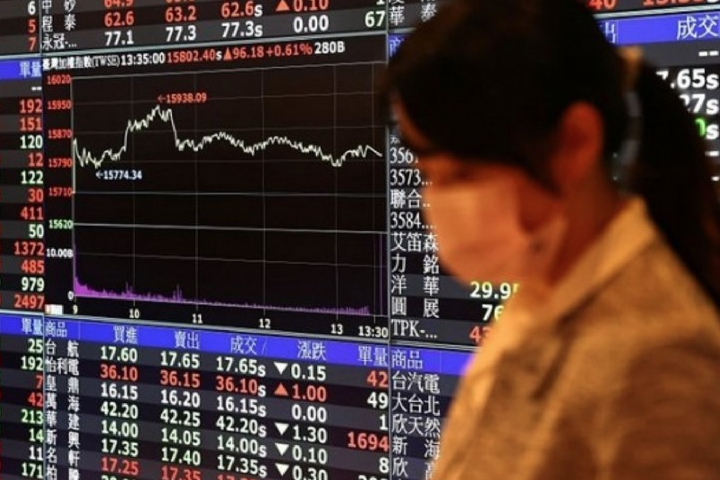Technology companies operating in the field of semiconductor chips and artificial intelligence had an impact on the direction of the markets, led by Nvidia.
Nvidia beat forecasts, posting a net profit of $12.29 billion in the last quarter, up 769 percent year-on-year.
After announcing profits above expectations in the last quarter, the company’s share price increased by 9 percent last week. Nvidia’s share price went up to 823.94 dollars. Thus, the company’s market value exceeded 2 trillion dollars for a while.
On the other hand, while the uncertainty about when the US Federal Reserve (Fed) will start cutting interest rates persists, the minutes of the Federal Open Market Committee (FOMC) meeting published last week showed that officials are concerned about the rapid easing of monetary policy.
The minutes showed that Fed officials weighed the possibility that further progress in curbing inflation may take longer than expected.
“Most officials noted the risks of moving too quickly to loosen the policy stance and emphasized the importance of carefully evaluating incoming data when deciding whether inflation has fallen sustainably to 2 percent. However, a few officials noted that maintaining an overly restrictive stance for too long points to downside risks to the economy.”
In the money markets, while it is certain that the Fed will leave the interest rate unchanged in March, the probability of the Bank starting to cut interest rates in May has dropped to 25 percent and the probability of starting in June has dropped to 67 percent.
In addition, international credit rating agency Standard & Poor’s kept its 2024 outlook for the US monetary policy unchanged and predicted that the Fed will cut the policy rate by 25 basis points at the June meeting and 75 basis points by the end of the year.
Statements by Fed officials were also closely monitored last week. Richmond Fed President Thomas Barkin emphasized that price pressures in sectors such as housing continued despite the decline in headline inflation, while Fed Board Member Michelle Bowman expressed her opposition to the possibility of a rate cut in the near future.
Fed Vice Chairman Philip Jefferson pointed out that the Bank’s strong actions have moved the policy rate into highly restrictive territory and that the tight monetary policy stance has put downward pressure on economic activity and inflation.
Jefferson said it would probably be appropriate to start lowering the policy rate later this year if the economy develops as generally expected, but said he could not give a timetable because of the risks.
Philadelphia Fed President Patrick Harker also said there was a risk that the Fed would cut interest rates too soon.
Stating that the Fed is on the last step of moving towards the 2 percent target in inflation, Harker said that the latest data show uneven progress in slowing inflation.
International Monetary Fund Spokesperson Julie Kozack also stated that although inflation is slowing, it is not yet close enough to the target and urged central banks to be cautious against premature easing of monetary policy.
While the developments in the Middle East continued to be in the focus of investors, the barrel price of Brent oil completed last week at 80.9 dollars with a 2.2 percent decrease. The ounce price of gold increased by 1.2 percent to 2 thousand 36 dollars. However, the US 10-year bond yield completed the week at 4.2560 percent, down 36 basis points. The dollar index also decreased by 0.3 percent to 103.9 last week.
New York stock market hits historic highs
Companies in the field of artificial intelligence and semiconductors contributed to the movement of indices led by Nvidia, while New York stock markets followed a positive course last week.
As part of the “IM-1” mission of the US-based company Intuitive Machines, the spacecraft named “Odysseus”, sent into space by SpaceX’s Falcon 9 rocket, landed on the Moon. The shares of the company, which realized the first US landing on the Moon since 1972, gained more than 30 percent last week.
On the other hand, companies in the country continued to announce their financial results. Walmart’s shares, which reported profits and revenues above expectations in the fourth quarter last year, gained more than 3 percent last week, while the company also announced that it will acquire smart television manufacturer Vizio for $ 2.3 billion in cash, or $ 11.50 per share.
The profit and revenue of Home Depot, one of the largest retail chains in the US, exceeded forecasts in the last 3 months of last year despite the decline in sales, but the total sales growth projected by the company in the 2024 fiscal year remained below expectations. Home Depot’s shares rose 3.2 percent last week.
On the macroeconomic data side, the number of first-time jobless claims in the US decreased by 12 thousand people to 201 thousand in the week ending February 17, recording the lowest level in 5 weeks.
The Purchasing Managers’ Index (PMI) for the manufacturing industry in the country increased by 0.8 points in February to 51.5, the highest level in 17 months, while the service sector PMI decreased by 1.2 points in February to 51.3, the lowest level in 3 months.
Second-hand home sales in the US increased by 3.1 percent in January, exceeding market expectations.
With these developments, the S&P 500 index gained 1.70 percent, the Dow Jones index 1.30 percent and the Nasdaq index 1.40 percent last week.
The S&P 500 index hit a historic high of 5,110.04, the Dow Jones index 39,282.28 and the Nasdaq index 16,134.22 points.
In the week starting on February 26, new home sales, Dallas Fed manufacturing activity index, durable goods orders, CB consumer confidence index on Tuesday, Gross Domestic Product (GDP), wholesale inventories on Wednesday, personal income and expenditures on Thursday, University of Michigan consumer confidence index on Friday will be followed.
European stock markets were positive except for the UK
While European stock markets followed a buying-weighted course last week, expectations that the European Central Bank (ECB) and the Bank of England (BoE) will start cutting interest rates in June continue.
The minutes of the ECB’s January monetary policy meeting revealed that ECB Governing Council members agreed that it was too early to discuss interest rate cuts.
The ECB made a loss for the first time since 2004 due to the interest rate hikes it went through last year as part of the fight against inflation. According to data released last week, the Consumer Price Index (CPI) in the Eurozone in January decreased by 0.4 percent on a monthly basis, while it increased by 2.8 percent on an annual basis, in line with expectations.
According to the ECB’s Survey of Consumer Expectations, the average inflation expectation of consumers in the Eurozone for 12 months rose from 3.2 percent to 3.3 percent.
BoE Governor Andrew Bailey also stated that it is not unreasonable for markets to expect rate cuts from the BoE this year.
While it is noteworthy that construction production in the Eurozone increased by 0.8 percent in December compared to November and 1.9 percent compared to the same period of the previous year, the number of new car sales in the EU market increased by 12.1 percent in January compared to the same month last year and reached 851,690.
On the German side, the government reported that it lowered its growth forecast for this year, which was previously announced as 1.3 percent, to 0.2 percent due to weak global demand, geopolitical uncertainties and high inflation. At the same time, the German economy shrank by 0.3 percent in the last quarter of 2023 compared to the previous quarter, as high inflation reduced the purchasing power of households.
On the other hand, last week, the German Central Bank (Bundesbank) stated that external demand is weakening, consumers are cautious in their spending and rising financing costs may continue to limit investments and that the German economy may enter a technical recession by contracting in the first quarter of this year after the last quarter of last year.
It was noteworthy that the share price of HSBC, one of Britain’s largest banks, fell more than 8 percent in the last quarter due to the decline in its pre-tax profit and the loss of value in its subsidiary Chinese financial institution.
Last week, the FTSE 100 index in the UK lost 0.1 percent, while the DAX index in Germany gained 1.76 percent, the CAC 40 index in France 2.56 percent and the MIB 30 index in Italy 3.22 percent.
The DAX index in Germany hit a record high of 17,443.74 points and the CAC 40 index in France hit a record high of 7,976.40 points.
Next week, consumer confidence index, real sector confidence index and economic confidence index data will be followed in the Eurozone on Wednesday, unemployment rate and CPI in Germany on Thursday, manufacturing PMI, CPI and unemployment rate data in the Eurozone on Friday.
Japan records in Asian stock markets
The increased risk appetite in the futures markets following Nvidia’s financial results also moved to Asian equity markets.
The People’s Bank of China (PBoC) lowered the 5-year loan rate (LPR), the benchmark for real estate loans.
In order to stimulate the real estate market in the country, the PBoC lowered the benchmark interest rate for home loans, the 5-year loan prime rate, by more than expected in the monthly fixing.
The PBoC cut the 5-year loan interest rate by 25 basis points from 4.20 percent to 3.95 percent, while leaving the one-year loan interest rate unchanged at 3.45 percent. Markets expected the rate cut to be 10 basis points.
Analysts stated that volatility increased in equity markets after the interest rate decision, and that the increase in the trading volume of various exchange-traded funds in the country gave a clue that state-backed funds continued to support the market.
On the other hand, according to data released last week in Japan, exports exceeded expectations with an annual increase of 11.9 percent in January.
The Purchasing Managers’ Index (PMI) for the manufacturing industry in the country fell to 47.2, the lowest level since August 2020, while the service sector PMI fell to 52.5.
The South Korean Central Bank, on the other hand, left the policy rate unchanged at 3.50 percent in its ninth meeting.
The dollar/yen parity, which carried its upward trend to the third consecutive week, completed last week at 150.4 with an increase of 0.1 percent.
Following these developments, the Nikkei 225 index in Japan gained 1.59 percent, the Hang Seng index in Hong Kong 2.36 percent, the Shanghai composite index in China 4.85 percent and the Kospi index in South Korea 0.54 percent on a weekly basis.
In Japan, the Nikkei 225 index extended its 1989 peak to 39,156.97 points last week.
In the week starting February 26th, data releases in Japan stand out. In Japan, CPI data will be announced on Tuesday, retail sales and industrial production data on Wednesday and unemployment rate data on Friday.





